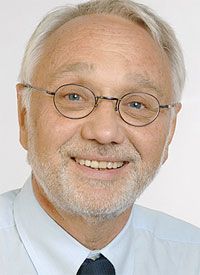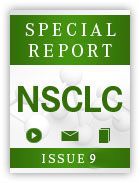Two Experts Weigh in on Treating Patients With Metastatic NSCLC and EGFR T790M Mutations
Dr Rolf A. Stahel, MD, and Dr Thomas E. Stinchcombe, MD, weigh in on treating patients with NSCLC.
Mutations in the epidermal growth factor receptor (EGFR) have served as the basis for using targeted therapies with tyrosine kinase inhibitors (TKIs) in patients with advanced nonsmall cell lung cancer (NSCLC); however, it is now known that the response duration to EGFR TKIs is short-lived for patients who harbor the exon 20 T790M mutation, and T790M has been recognized as the most common mechanism of TKI drug resistance. Recent research has been aimed at expanding treatment options for patients with T790M NSCLC, who are typically treated with cytotoxic chemotherapies.
EGFRT790M: Some Recent Findings
- Recent, back-to-back publications in theNew England Journal of Medicinehave demonstrated the clinical activity of two next-generation TKIs, AZD9291 and rociletinib, in patients with T790M mutation and disease progression while on first- or second-generation EGFR TKIs.1,2
- The results of an open-label randomized phase II Japanese study published in 2014 have suggested that combining erlotinib with the angiogenesis inhibitor, bevacizumab was an active regimen in patients with NSCLC and activatingEGFRmutations (N = 154 enrolled). The results showed that progression-free survival (PFS) was improved by over 6 months compared with erlotinib alone, suggesting that this novel combination therapy should be further investigated as a potential first-line treatment for patients withEGFRmutated NSCLC.3
- More recently, findings presented at the 2015 European Cancer Conference have corroborated these findings.4,5The 1-year PFS rate was 72% for patients treated with the bevacizumab/erlotinib combination who had the T790M mutation, whereas it was 49.4% for patients withEGFRmutation but no T790M, suggesting that combining bevacizumab and erlotinib was also active in patients with T790M.5
Targeted Oncologyspoke with two leading experts on the current relevance of T790M mutations in metastatic NSCLC.
NSCLC

Rolf A. Stahel, MD
Rolf A. Stahel, MD, is lead author on the recent European Cancer Conference presentation, and a professor in the Department of Oncology at University Hospital in Zurich, Switzerland; he also serves as the current president of European Society for Medical Oncology (ESMO).
Q: What is the importance of detectingEGFRT790M mutation in patients with advanced NSCLC?
A: If detected prior to treatment with EGFR TKIs, the response duration to EGFR TKIs is short. If detected during progression on EGFR TKI, there is now the opportunity to switch to a mutation-specific TKI active against T790M such a rociletinib or AZD9291.
Q: What findings from the 2015 European Cancer Conference might have implications for treatment of these patients?
A: The combination of erlotinib and bevacizumab frontline in EGFR-mutated NSCLC in Caucasian patients is associated with a longer PFS compared with the previous studies using erlotinib alone, which corroborates the results of a phase II randomized trial from Japan. One-third of patients had pretreatment T790M detectable using a very sensitive method. The combination of erlotinib and bevacizumab gave particularly encouraging results in this cohort of patients.
NSCLC

Thomas E. Stinchcombe, MD
Thomas E. Stinchcombe, MD, is an assistant professor in the Division of Hematology and Oncology and codirector of the multidisciplinary thoracic oncology program at the University of North Carolina Lineberger Cancer Center.
Q: What is the importance of detectingEGFRT790M mutation in patients with advanced NSCLC?
A: First line EGFR TKIs have a response rate and PFS of 70% to 80% and a median PFS of 10 to13 months inEGFRmutant NSCLC. However, all patients eventually experience disease progression. The most common mechanism of resistance identified is an exon 20 T790M mutation, which has been identified in approximately 50% to 60% of tumor biopsies performed in patients who have experienced disease progression on an EGFR TKI.
Q: What is the current standard of care for patients with metastatic NSCLC and T790M mutations?
A: Until recently, there has not been a standard practice for treating patients with a known T790M mutation who had experienced disease progression after receiving an EGFR TKI. However, two recent agents have demonstrated significant activity in patients withEGFR-mutant NSCLC and known T790M. In a phase I trial with an expansion cohort, AZD9291 demonstrated an objective response rate (ORR) of 61% (95% CI, 52-70) and a median PFS of 9.6 months (95% CI, 8.3 to not reached; 30% maturity).1A phase I/II study of rociletinib (CO-1686) demonstrated an ORR of 59% (95% CI, 45-73) and a median PFS 13.1 months (95% CI, 5.4-13.1) with data on 82% of patients censored.2Both of these agents spare EGFR wild-type and consequently have a lower rate of EGFR associated toxicities of rash and diarrhea than that observed with first-generation EGFR TKIs. The PFS data reported should be considered as preliminary, but the response rates and low rate of adverse events are impressive.
Q: What findings from the 2015 European Cancer Conference might have implications for treatment of these patients?
A: The combination of erlotinib and bevacizumab was compared with erlotinib as first-line therapy in randomized phase II trial in treatment-naïve patients withEGFR-mutant NSCLC. The primary endpoint was PFS by independent radiologic review.3The trial demonstrated a statistically significant improvement in PFS with the combination compared with erlotinib (HR, 0.54; 95% CI, 0.36-0.79; P= .0015; median 16.0 and 9.7 months, respectively). The Spanish Lung Cancer Group and European Thoracic Oncology Platform performed a single-arm phase II trial of erlotinib and bevacizumab that was recently presented at the 2015 European Cancer Conference. The primary endpoint was PFS in patients with and without T790M mutation at baseline.4The PFS observed in the intent-to-treat patient population (n = 109) was 13.8 months (95% CI, 10.3-21.3), and in the T790M positive (n = 37) and negative (n = 72) was 16.0 months (95% CI, 31.1 to not available) and 10.5 months (95% CI, 9.2-16.2), respectively. While the subset data is preliminary, the prolonged PFS in patients with baseline T790M is provocative. The ongoing randomized phase II US trial of erlotinib with and without bevacizumab inEGFR-mutant NSCLC should provide additional information about the activity of the erlotinib and bevacizumab (NCT01532089).
References
- Janne PA, Yang JC, Kim DW, et al: AZD9291 in EGFR inhibitor-resistant non-small-cell lung cancer.N Engl J Med. 2015;372(18):1689-1699.
- Sequist LV, Soria JC, Goldman JW, et al: Rociletinib in EGFR-mutated non-small-cell lung cancer.N Engl J Med. 2015;372(18):1700-1709.
- Seto T, Kato T, Nishio M, et al: Erlotinib alone or with bevacizumab as first-line therapy in patients with advanced non-squamous non-small-cell lung cancer harbouring EGFR mutations (JO25567): an open-label, randomised, multicentre, phase 2 study.Lancet Oncol. 2014;15(11):1236-1244.
- Stahel R, Dafni U, Gautschi O, et al: A phase II trial of erlotinib (E) and bevacizumab (B) in patients with advanced non-small-cell lung cancer (NSCLC) with activating epidermal growth factor receptor (EGFR) mutations with and without T790M mutation. The Spanish Lung Cancer Group (SLCG) and the European Thoracic Oncology Platform (ETOP) BELIEF trial. Presented at: 2015 European Cancer Congress September 25-29, 2015; Vienna, Austria; Abstract 3BA.
- Combination Therapy Shows Survival Benefit in EGFR T790M-Mutant NSCLC. http://www.targetedonc.com/news/combination-therapy-shows-survival-benefit-in-egfr-t790m-mutant-nsclc- Accessed: November 10, 2015

Survivorship Care Promotes Evidence-Based Approaches for Quality of Life and Beyond
March 21st 2025Frank J. Penedo, PhD, explains the challenges of survivorship care for patients with cancer and how he implements programs to support patients’ emotional, physical, and practical needs.
Read More